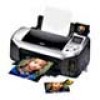Epson Stylus Photo R300M User Manual - Page 84
Printing a P.I.M. Image, Photoshop 7.0 or Elements, Photoshop 6.0
 |
View all Epson Stylus Photo R300M manuals
Add to My Manuals
Save this manual to your list of manuals |
Page 84 highlights
8. Select and open more images, or click Cancel to close the Open PRINT Image Matching II file window. (If you don't want the window to remain on the screen after you open a file, uncheck Import consecutively.) 9. Follow the steps in the next section to print your P.I.M. image. To keep the P.I.M. header information intact for use in other P.I.M.-enabled programs, keep the original file; don't use the Photoshop Save command. Instead use Save As to rename the file. It won't contain P.I.M. header information, but will retain P.I.M. image quality, as long as the file is saved with the ICC profile embedded. Note: If you overwrite your original file, you will lose all P.I.M. header information. Printing a P.I.M. Image P.I.M. images are converted into the EPSON RGB 2001 color space. To retain P.I.M. quality and enhancements, don't change the color space. 1. Open the File menu, then: Photoshop 7.0 or Elements: Select Print Preview > Print Options, or Print with Preview. Then click Show More Options > Color Management. Photoshop 6.0: Select Print. You see a window like this: Select the profile for your printer and paper 2. In the Print Space box, select the Stylus Photo R300 profile for the paper you're printing on. We recommend Perceptual as the Intent setting. 3. Photoshop 7.0 or Elements: Click Print. You see the printer settings window. Photoshop 6.0: In Windows, click Setup, then select your printer and click Properties or Preferences. Go to step 5. 84 Printing From Your Computer















